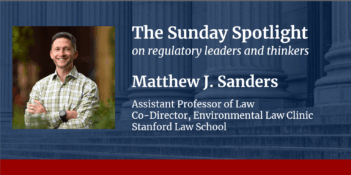Economists Still Agree on Climate Change
Despite the retraction of a recent study, economists still agree that climate change is expensive and dangerous.
EPA’s Problematic Case for Rescinding Its Endangerment Finding
EPA’s decision to retreat from regulating greenhouse gas emissions runs contrary to law.
The Future of the Tennessee Valley Authority
Scholars assess the TVA as a blueprint for publicly owned utilities in the green energy transition.
The Silent Ethylene Oxide Emergency
OSHA’s outdated standards endanger American workers by failing to limit ethylene oxide exposure.
Habitat Protection Matters for Species Conservation
Scholars explore paths to protect wildlife under the Endangered Species Act.
Predicting Turbidity, Protecting Tap Water
Scholars analyze how the use of machine learning could reshape EPA drinking water standards.
EPA Proposes Rollbacks to Chemical Regulation
A proposed rule seeks to reverse recent changes to the procedures EPA uses to conduct risk assessments of toxic chemicals.
The Viability of Local Energy Communities
Scholars discuss methods to encourage the creation of local energy communities.
Orbital Debris Mitigation Guidelines
Scholars address methods to ensure the long-term sustainability of low-Earth orbit.
Lack of Coordination Threatens Environmental Policy
Without interagency and intergovernmental cooperation under NEPA, environmental outcomes will suffer.
The Power of Procedure in Environmental Law
Matthew J. Sanders explores the importance of procedure in the evolving environmental law landscape.
A Land Use Revolution in the Green Mountain State
Vermont reforms its land-use system to balance economic development and the environment.












